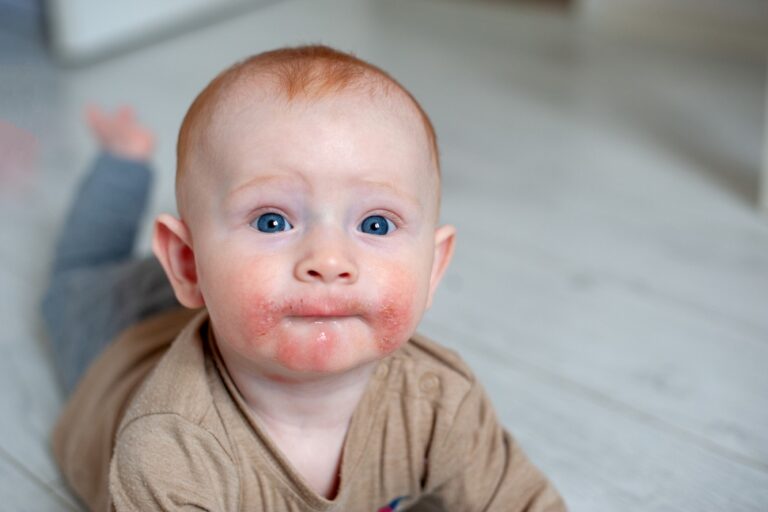
After the birth of your precious little one, you may notice the appearance of small bumps, pimples, or blemishes on their delicate face a few weeks later. This is a common condition known as baby acne, which can cause pimple-like spots to develop on a newborn’s skin.
This condition is usually not harmful and often goes away on its own without requiring any treatment. Still, it is important to take extra care of your baby’s sensitive skin during this time.
If you’re a new parent, you may feel overwhelmed and unsure about how to care for your baby’s soft skin. Don’t worry; we’ve got you covered!
This article will walk you through the steps to properly care for your little one’s skin so they can stay healthy and happy. Let’s get hopping into it and learn more about this important topic.
What Is Baby Acne?
Your newborn may develop small blemishes or pimples on their face, nose, cheeks, or forehead when they are 2 to 5 weeks old. This condition is known as baby acne or neonatal acne, which affects around 3 out of 10 babies. It is a common and short-term skin condition that resolves within a couple of days.
What Causes Baby Acne?
Infants may develop acne due to factors such as hormone changes in the placenta. Sebum is another reason behind the onset of acne in infants. It’s an oily substance produced by sebaceous glands that can clog pores and cause acne.
Additionally, babies have delicate skin, and maternal hormones before birth can also contribute to baby acne.
Forty percent of newborns develop baby acne at two to three weeks of age, which usually lasts until six months old. However, it is not a cause for concern and resolves on its own.
Where Do Symptoms of Baby Acne Appear?
Newborn acne resembles teen or adult acne and can be present as red bumps, clogged pores, and small pimples, often appearing as a bumpy red rash.
It often appears on the face, including the cheeks and nose, but can also affect the scalp, neck, chin, back, or chest. Infant acne may come and go over several weeks. In some rare cases, it can worsen when the baby gets fussy or starts crying.
How Is Baby Acne Diagnosed?
If your newborn develops acne, it may appear on the cheeks, nose, forehead, chin, scalp, neck, back, or chest. Nevertheless, it is typically not a cause of huge concern.
It rarely causes scarring and usually resolves on its own within a few weeks to months. Diagnosis can usually be made with a simple visual exam, and no testing is required.

How Is Baby Acne Treated?
It is common for babies to experience acne, which is usually a temporary condition that resolves on its own without any medical intervention. However, every baby’s skin is different, and in some cases, healthcare providers may suggest treatment options.
These treatments may vary depending on the severity of the condition and can have a range of options tailored to the individual baby’s needs. They typically include:
- An antifungal cream.
- A topical steroid with low potency.
You can apply this to your baby’s skin just like a moisturizer or a lotion. Also, make sure to follow your healthcare provider’s instructions on how often you should apply these medications to your baby’s skin and what the quantity should be.
Home Remedies of Baby Acne
Home remedies are great for babies with sensitive skin, as they are affordable and easily accessible. Here are a few effective natural remedies for your baby’s delicate skin:
-
Cornstarch
You can find cornstarch at almost every grocery store, and it’s considered one of the best baby acne remedies. Apply the mixture of water and cornstarch to your baby’s skin. It naturally dries the skin and treats acne.
-
Breast Milk
Breast milk also proves to be quite effective in treating baby acne. Simply soak a cotton ball in breast milk and apply it to the affected areas.
-
Honey and Lemon
Honey and lemon are also considered useful in treating acne. They cleanse and nourish delicate skin. Mix equal parts honey and lemon, apply to the affected area for 25 minutes, then rinse with warm water.
Conclusion
Baby acne is a common and harmless skin condition that typically resolves within a few days without causing scarring.
However, it’s natural for parents to feel worried and overwhelmed by the appearance of acne on their baby’s delicate skin, so be sure to use a gentle and caring approach when treating baby acne.
If the acne doesn’t subside on its own within a few days, then contact your baby’s healthcare provider.
FAQs:
Can Breastmilk Help Baby Acne?
It’s worth noting that breast milk has natural antimicrobial properties, which can be extremely beneficial in reducing bacterial growth and alleviating baby acne.
Apply breast milk directly to your little one’s face using a gentle cotton ball or swab. This method can not only help improve your baby’s skin health, but it’s also a safe and natural alternative to more chemically-based acne treatments.
How Do I Eliminate My Baby’s Acne?
Acne in infants usually goes away on its own, but consult your baby’s doctor if it appears infected. Look out for redness, swelling, discharge, fever, or other symptoms.
In the meantime, make sure to follow the tips below to help relieve the symptoms:
- Clean your baby’s face daily by washing it with lukewarm water.
- Dry your baby’s face gently.
- Don’t pinch or scrub the acne.
- Minimize the use of ointments, lotions, and oils on your little one’s affected skin areas.
Is Baby Acne Painful For The Baby?
It’s understandable that the presence of acne on your newborn’s delicate skin can be very concerning. But it’s important to note that baby acne is a common and harmless condition that commonly does not cause any discomfort or irritation to your baby. Rest assured that it typically resolves on its own without any intervention required.